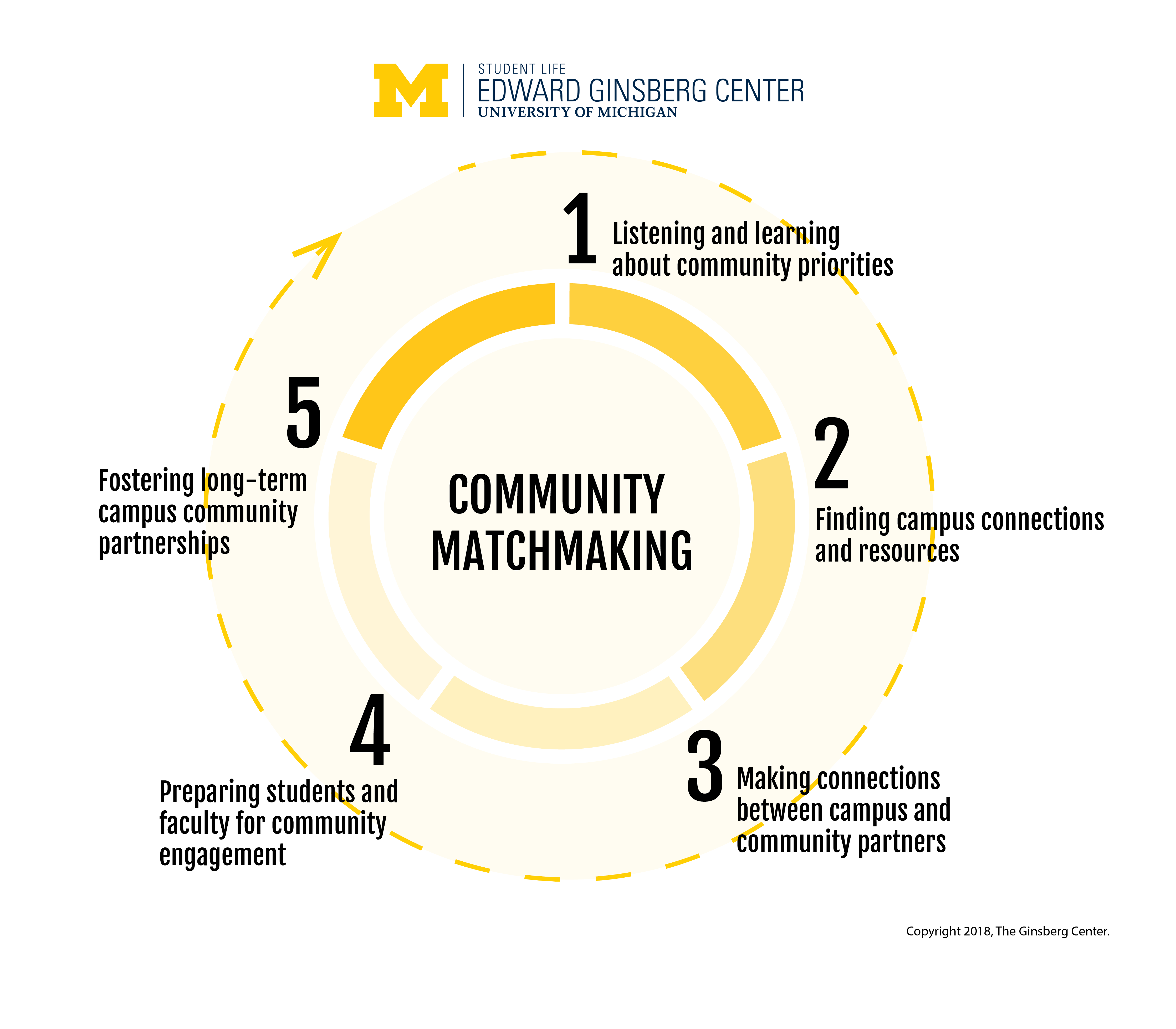
Ginsberg Center staff regularly meet with local community partners in the social sector (nonprofits), civic sector (government agencies) and education sector (k-12 schools) partners in Southeast Michigan. We gather and collect their community-defined priorities to share with university partners.
Meet with Ginsberg staff to explore our database of relevant opportunities that align community-defined priorities with your:
- Teaching: topics, learning objectives, and/or discipline-specific skills
- Research: current or potential projects for you or your students
- Service: relevant opportunities to which you can lend your time and expertise
- Academic Programs: content area or skills
- Explore multiple examples of ways to connect with community-defined priorities.
- Complete our Support Request Form to set up a meeting.
How can I...
[CONNECTING WITH COMMUNITIES]
- Use our Connect2Community web portal to explore volunteer opportunities in southeast Michigan. This online portal keeps a real-time list of individual and group opportunities to meet community-identified needs. Connect2Community is managed by the Ginsberg Center in collaboration with the United Way of Southeastern Michigan.
- We know from past natural disasters and emergencies that initial waves of volunteers often become fatigued, creating the need for replenishment and respite personnel. Check the portal regularly for new opportunities to contribute to our community as needs arise and shift.
- Learn more about how to search by interests and other filters (including remote opportunities) here.
- We support collaboratives that bring together university and community partners around similar community-identified prioritities that can not only build community capacity in these areas but also give faculty and students the chance to practice skills and meet educational goals.
- As an example, the Ginsberg Center coordinates the Community Technical Assistance Collaborative (CTAC), which focuses on data and evaluation. If you are interested in learning more about CTAC, contact us at [email protected].
- We also support issue-based collaboratives, allowing university and community partners to regularly connect and strategize to support and develop ongoing partnerships.
- Contact us at [email protected] if you would like to learn more, join one of these collaboratives or explore other potential collaboratives with us.
[ESTABLISHING EFFECTIVE PARTNERSHIPS]
- Be mindful that not all organizations’ timelines will match the University’s academic calendar, so reach out early enough to be able to work through scheduling challenges.
- To find a partner through the Ginsberg Center, we recommend contacting us at least a month in advance. Budgeting extra time to connect with partners has become even more critical as partners continue to adjust to the pandemic.
- At the first meeting, have an open conversation to discuss and establish mutually agreed upon expectations.
- We recommend documenting in writing the expectations for a partnership.
- This Summary of Expectations template may be useful to use with the organizations involved in your teaching or research.
- For support with implementing these recommendations, contact us to set up a consultation.
- If students will be working remotely, it is important to discuss what virtual engagement will look like with students and partners ahead of time – expectations, communication plans and relationship building
- Numerous community partners have shared the challenges of working with students effectively when partners have no prior knowledge about the course or program from which students are engaging.
- We recommend instructors first contact community partners, prior to having students initiate contact.
- Reach out to partners prior to the start of the class or program to provide background information including course/program objectives, hours or project. requirements involving the community partner, length of requested involvement, etc.
- Discuss with the partner how they would like to be involved.
- If you are considering asking students to find their own opportunities as part of your class and do not plan to contact community partners in advance of students initiating contact.
- Have students contact partners in the first 2 weeks of the semester, well in advance of when an assignment is due
- Have students learn more about the organization prior to initiating contact
- Provide students with a summary of the course context they can share with partners when they initiate contact, including course objectives, hours or project requirements involving the community partner
- Help prepare students to work effectively with community partners.
- The Community Engagement MOOC offers online training for ethical engagement.
- The Ginsberg Center offers additional support to prepare your students:
- We offer introductory and follow-up workshops to prepare students that can be tailored to your needs.
- Ginsberg Center staff can also work with you to support your use of the MOOC. Contact us to set up a consultation.
[MANAGING LOGISTICS]
- In recognition of the significant contributions partners make to student learning, we recommend compensating community partners for their time and effort.
- Have an open conversation with partners about how they would like to be compensated, since partners' preferences vary.
- Some partners prefer to not be compensated directly, but rather to have funds go directly to the organization. Other partners have mentioned preferring in-kind support such as volunteer hours from students or other forms of support.
- The partner/organization may also need to complete a W-9 vendor form to be listed as a vendor within the UM system. To allow funds to be directed to an organization, partners can submit an invoice detailing the service provided.
- The Ginsberg Center offers faculty grants for community engaged research and teaching in partnership with several other units on campus.
- Additional funding opportunities are also listed on the Engaged Michigan site.
- Contact us at [email protected]if you have any questions about these funding opportunities.
